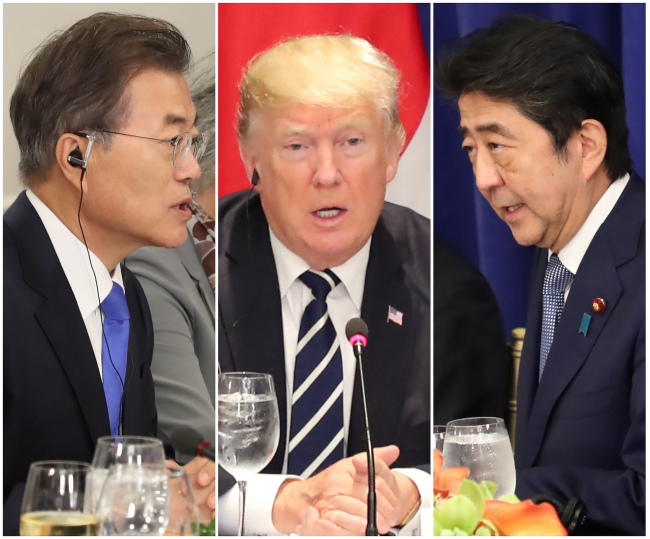South Korean President Moon Jae-in ended his four-day visit to the United Nations General Assembly in New York, where he had sought international support for efforts to contain the wayward North Korea.
His talk of peace on the global diplomatic stage, however, appears to have made little impact, as the war rhetoric between the US and North Korea only became fiercer with the North’s leader Kim Jong-un threatening “highest-level” actions to make “deranged” US President Donald Trump “pay dearly” for his words.
 |
From left: South Korean President Moon Jae-in, US President Donald Trump, Japanese Prime Minister Shinzo Abe (Yonhap) |
In his UN speech Tuesday, Trump said the US would have to “totally destroy” the North, if the communist regime posed a direct threat to it or its allies.
Kim’s remarks -- a rare statement issued by the young leader from the North’s founding family -- came as a direct response to Trump’s UN address.
It also came just hours after Moon called for “peaceful, diplomatic and political solutions” to the North Korean crisis, ruled out war and urged “stable management” of the situation in order to prevent unnecessary escalation of tensions.
Before embarking on his flight back home, Moon sat down with Trump for bilateral talks in his second summit with the US leader since taking office in May.
The two agreed to expand the deployment of US strategic assets to South Korea and surrounding areas, underscoring the need to maintain overwhelming deterrence against the North, Cheong Wa Dae spokesman Park Soo-hyun said at a press briefing.
They also agreed to strengthen their countries’ joint defense capabilities, partly through Seoul’s acquisition and development of “the most advanced military assets,” Park said.
“The two leaders shared a view on the need for the strongest pressure and sanctions against North Korea to deter North Korea’s provocative activities and make it start taking steps toward denuclearization,” he said.
Earlier reports suggested the leaders were set to announce an agreement for Seoul’s acquisition or development of nuclear-powered submarines, a strategic asset that could counter North Korea’s submarine-launched ballistic missiles. Seoul earlier dismissed the reports.
The Cheong Wa Dae spokesman refused to confirm whether Seoul’s acquisition of the most advanced military assets would include nuclear-propelled submarines.
The Moon-Trump meeting was quickly followed by a three-way summit involving Japanese Prime Minister Shinzo Abe, where the three leaders vowed to put maximum pressure on North Korea.
“The leaders noted North Korea’s nuclear and missile development posed a grave threat to peace in Northeast Asia and the world and that they cannot accept this,” South Korean Foreign Minister Kang Kyung-wha told a press briefing.
“Under such understanding, the leaders of the three countries agreed on the need for the international community to put maximum pressure and sanctions to the level that North Korea cannot withstand and (that would make it) voluntarily come to the dialogue table,” she added.
The Japanese leader also called for additional measures.
“Recently, UN sanctions were adopted unanimously. These are very powerful measures. But we need more,” Abe said, according to Cheong Wa Dae pool reports.
Trump introduced his new executive order, enhancing the Treasury Department’s authority to target any individuals or entities that conduct “significant trade in goods, services or technology with North Korea.”
Moon welcomed the new step.
“I believe the United States’ unilateral step, through the executive order President Trump just mentioned ... will have a great impact on our striving to achieve North Korea’s complete denuclearization. I again thank President Trump, who has made a firm decision, and promise that South Korea too will do its utmost to support the measure,” he said.
By Lee Sun-young & news reports (
milaya@heraldcorp.com)








![[Today’s K-pop] Blackpink’s Jennie, Lisa invited to Coachella as solo acts](http://res.heraldm.com/phpwas/restmb_idxmake.php?idx=644&simg=/content/image/2024/11/21/20241121050099_0.jpg)